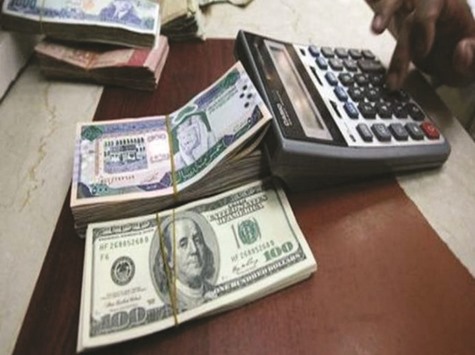Banks in Saudi Arabia are coming under fresh pressure over products that allow speculators to bet against the kingdom’s currency peg, according to people with knowledge of the matter.
The Saudi Arabia Monetary Agency has asked lenders to explain why they are offering dollar-riyal forward structured products to customers less than four months after the regulator banned options contracts that let speculators place wagers on a currency devaluation, the people said. The authority, known as SAMA, didn’t reply to requests for comment.
Hedge funds such as PointState Capital and Pershing Square Capital Management have made bets that the country’s peg to the dollar will be broken as oil revenue plunges, even as the country maintains it has no plans to devalue and analysts including Capital Economics say such a move would be a last resort. Riyal forwards surged to 660 points, the highest since February 15.
“SAMA is likely getting concerned about the renewed volatility on the SAR forwards,” Apostolos Bantis, head of emerging market corporate research at Commerzbank, said by phone. “Considering its strong commitment to the peg and aim to keep volatility low, they may try to disincentivise local banks using other structured products.”
SAMA is asking banks to explain the rationale and relevance of the structured products for the economy and explain why they’ve entered into the products without informing the central bank, according to the people. It also wants transaction details of the derivatives since January 18.
It’s also seeking to understand the impact of the products on Saudi banks’ US dollar buy positions from the central bank as well as the risks to customers and banks, they said. The central bank warned any future structured derivative product should be submitted to SAMA for review and approval before they’re launched.
Saudi Arabia is undergoing its biggest-ever economic shakeup, led by Deputy Crown Prince Mohammed bin Salman, as it prepares for the post-oil era following the plunge in crude prices that started in 2014. One of the government’s biggest challenges will be navigating the worst economic slowdown since the global financial crisis as authorities cut spending to plug a budget deficit that reached about 15% of gross domestic product in 2015.
PointState Capital’s Zach Schreiber, who made $1bn betting against oil two years ago, is wagering that weaker long-term crude prices and rising costs will cause the country to abandon the peg, he said earlier this month. Bill Ackman, the billionaire founder of Pershing Square, wrote in his annual letter to investors in January that Saudi Arabia along with China was “inadvisably” spending billions of dollars to protect its currency.
The country doesn’t plan to change the riyal exchange policy, Saudi Arabia Monetary Agency Governor Ahmed Alkholifey told Al-Arabiya in an interview. He said the economy continues to perform well despite the drop in oil prices, and that the country has capability to protect the exchange rate.
Twelve-month contracts for the riyal began to fall after SAMA told banks not to sell options contracts on riyal forwards at a meeting in Riyadh on January 18. The forwards started to climb again earlier this month when Alkholifey was appointed the head of the central bank. His promotion reignited speculation the kingdom may reconsider its exchange rate.
The country has slowed payments to contractors and suppliers, started borrowing from local and international banks, and tapped the country’s foreign reserves to deal with runaway spending and lower income from oil’s slump. The kingdom sent invitations to banks to arrange the sale of it’s first sovereign bonds in the international capital markets last week, people familiar told Bloomberg.
Saudi Arabia has been financing its budget deficit by selling local debt and drawing down foreign reserves. The central bank’s net foreign assets have tumbled by more than 500bn riyals ($133bn) since the start of 2015 to 2.19tn riyals in February.

The Saudi Arabia Monetary Agency has asked lenders to explain why they are offering dollar-riyal forward structured products to customers less than four months after the regulator banned options contracts that let speculators place wagers on a currency devaluation, sources said.
